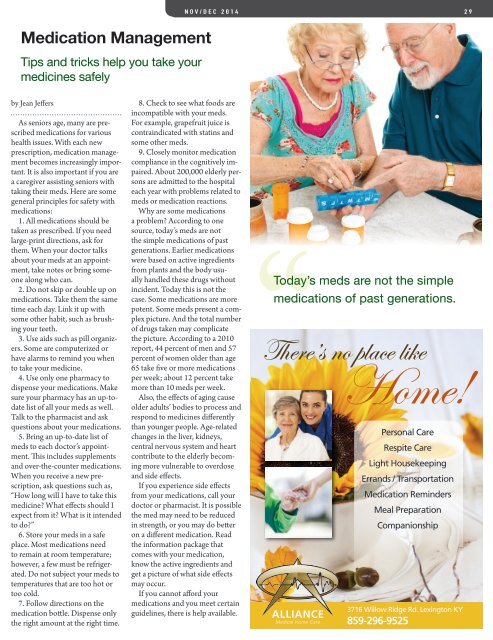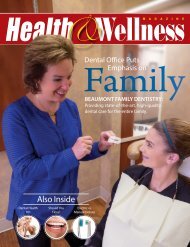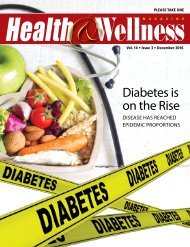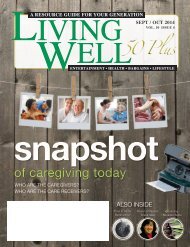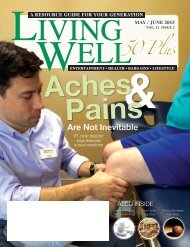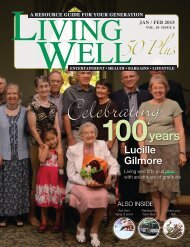Living Well 60+ November – December 2014
Create successful ePaper yourself
Turn your PDF publications into a flip-book with our unique Google optimized e-Paper software.
NOV/DEC 2 0 1 4<br />
2 9<br />
Medication Management<br />
Tips and tricks help you take your<br />
medicines safely<br />
by Jean Jeffers<br />
As seniors age, many are prescribed<br />
medications for various<br />
health issues. With each new<br />
prescription, medication management<br />
becomes increasingly important.<br />
It is also important if you are<br />
a caregiver assisting seniors with<br />
taking their meds. Here are some<br />
general principles for safety with<br />
medications:<br />
1. All medications should be<br />
taken as prescribed. If you need<br />
large-print directions, ask for<br />
them. When your doctor talks<br />
about your meds at an appointment,<br />
take notes or bring someone<br />
along who can.<br />
2. Do not skip or double up on<br />
medications. Take them the same<br />
time each day. Link it up with<br />
some other habit, such as brushing<br />
your teeth.<br />
3. Use aids such as pill organizers.<br />
Some are computerized or<br />
have alarms to remind you when<br />
to take your medicine.<br />
4. Use only one pharmacy to<br />
dispense your medications. Make<br />
sure your pharmacy has an up-todate<br />
list of all your meds as well.<br />
Talk to the pharmacist and ask<br />
questions about your medications.<br />
5. Bring an up-to-date list of<br />
meds to each doctor’s appointment.<br />
This includes supplements<br />
and over-the-counter medications.<br />
When you receive a new prescription,<br />
ask questions such as,<br />
“How long will I have to take this<br />
medicine? What effects should I<br />
expect from it? What is it intended<br />
to do?”<br />
6. Store your meds in a safe<br />
place. Most medications need<br />
to remain at room temperature;<br />
however, a few must be refrigerated.<br />
Do not subject your meds to<br />
temperatures that are too hot or<br />
too cold.<br />
7. Follow directions on the<br />
medication bottle. Dispense only<br />
the right amount at the right time.<br />
8. Check to see what foods are<br />
incompatible with your meds.<br />
For example, grapefruit juice is<br />
contraindicated with statins and<br />
some other meds.<br />
9. Closely monitor medication<br />
compliance in the cognitively impaired.<br />
About 200,000 elderly persons<br />
are admitted to the hospital<br />
each year with problems related to<br />
meds or medication reactions.<br />
Why are some medications<br />
a problem? According to one<br />
source, today’s meds are not<br />
the simple medications of past<br />
generations. Earlier medications<br />
were based on active ingredients<br />
from plants and the body usually<br />
handled these drugs without<br />
incident. Today this is not the<br />
case. Some medications are more<br />
potent. Some meds present a complex<br />
picture. And the total number<br />
of drugs taken may complicate<br />
the picture. According to a 2010<br />
report, 44 percent of men and 57<br />
percent of women older than age<br />
65 take five or more medications<br />
per week; about 12 percent take<br />
more than 10 meds per week.<br />
Also, the effects of aging cause<br />
older adults’ bodies to process and<br />
respond to medicines differently<br />
than younger people. Age-related<br />
changes in the liver, kidneys,<br />
central nervous system and heart<br />
contribute to the elderly becoming<br />
more vulnerable to overdose<br />
and side effects.<br />
If you experience side effects<br />
from your medications, call your<br />
doctor or pharmacist. It is possible<br />
the med may need to be reduced<br />
in strength, or you may do better<br />
on a different medication. Read<br />
the information package that<br />
comes with your medication,<br />
know the active ingredients and<br />
get a picture of what side effects<br />
may occur.<br />
If you cannot afford your<br />
medications and you meet certain<br />
guidelines, there is help available.<br />
Today’s meds are not the simple<br />
medications of past generations.<br />
There’s no place like<br />
Home!<br />
ALLIANCE<br />
Medical Home Care<br />
Personal Care<br />
Respite Care<br />
Light Housekeeping<br />
Errands / Transportation<br />
Medication Reminders<br />
Meal Preparation<br />
Companionship<br />
3716 Willow Ridge Rd. Lexington KY<br />
859-296-9525


